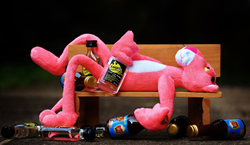[ad_1]

People who develop bad habits struggle with more than just the habit itself.
Compulsive behaviors almost always have an emotional or psychological component.
MONTREAL (PRWEB)
June 29, 2021
Bad habits are notoriously hard to break – that’s why they’re called habits, after all. Ask any dieter, smoker, or shopping addict why they continue to engage in a behavior that they know is not good for them, and they’ll likely respond with a shrug and a look of utter helplessness. The problem is that whatever pleasure or comfort giving in to the habit may bring, it is short-lived. Moreover, according to research from PsychTests.com, people who engage in such compulsive behaviors are more likely to struggle with a number of deeper emotional issues.
Analyzing data collected from 12,259 people who took the Emotional Intelligence Test, PsychTests’ researchers compared people who engage in compulsive habits (“Habit-Engagers”) to those who don’t (“Habit-Resisters”). Here’s how the two groups compared:
Habit-Engagers scored lower on a number of emotional intelligence competencies, including the following:
(Note: Scores range on a scale from 0 to 100)
- Comfort with emotional situations or people – score of 47 vs. 69 for Habit-Resisters, a 22-point difference.
- Emotional control – score of 39 vs. 74 for Habit-Resisters, a 35-point difference.
- Self-motivation – score of 52 vs. 77 for Habit-Resisters, a 25-point difference.
- Self-awareness – score of 56 vs. 76 for Habit-Resisters, a 20-point difference.
- Coping skills – score of 61 vs. 79 for Habit-Resisters, an 18-point difference.
- Resilience – score of 61 vs. 82 for Habit-Resisters, a 21-point difference.
- Self-esteem – score of 50 vs. 80 for Habit-Resisters, a 30-point difference.
- Positive mindset – score of 52 vs. 77 for Habit-Resisters, a 26-point difference.
- Contentment – score of 47 vs. 75 for Habit-Resisters, a 28-point difference.
- Tendency to ruminate excessively – score of 67 vs. 30 for Habit-Resisters, a 37-point difference.
PsychTests study also revealed that:
- 59% of Habit-Engagers are very sensitive to criticism (compared to 20% of Habit-Resisters, a difference of 39%).
- 49% feel like they’re on a constant emotional roller coaster (compared to 10% of Habit-Resisters, a difference of 39%).
- 59% are terrified of the future (compared to 18% of Habit-Resisters, a difference of 41%).
- 38% are never satisfied with what they’ve achieved (compared to 16% of Habit-Resisters, a difference of 22%).
- 39% perceive their lives as being one problem after another (compared to 8% of Habit-Resisters, a difference of 31%).
- 55% constantly doubt themselves (compared to 10% of Habit-Resisters, a difference of 45%).
- 46% do not like change (compared to 14% of Habit-Resisters, a difference of 32%).
- 41% are ashamed of how they look or behave (compared to 4% of Habit-Resisters, a difference of 37%).
- 46% dwell on failures, rejections, or disappointments (compared to 10% of Habit-Resisters, a difference of 36%).
- 43% harshly insult or criticize themselves when they mess up (compared to 8% of Habit-Resisters, a difference of 35%).
- 71% tend to over-analyze situations and create problems out of nothing (compared to 24% of Habit-Resisters, a difference of 47%).
- 48% have been formally diagnosed with depression, or are feeling depressed but have not brought it up with a healthcare or mental health professional (compared to 11% of Habit-Resisters, a difference of 37%).
- 56% have been formally diagnosed with anxiety, or are feeling anxious but have not had consulted a healthcare or mental health professional (compared to 18% of Habit-Resisters, a difference of 38%).
“Compulsive behaviors almost always have an emotional or psychological component,” explains Dr. Ilona Jerabek, president of PsychTests. “For example, the basis of a food addiction is not physical hunger – the person eats to fulfill an emotional need, such as a desire for comfort after a stressful experience, or to suppress unpleasant feelings, whether it’s sadness, anxiety, or even boredom. This creates a vicious cycle: bad feelings trigger the bad habit, which triggers more bad feelings, and the pattern continues. And until you’re willing to face the trauma that bred them, you’ll have a difficult time breaking the habit. You’ll also, as our study revealed, struggle with a host of other emotional and psychological issues, such as problems with self-esteem, stress management, and emotional control. Compulsive habits are compulsive for a reason – because you keep doing the same thing and expecting a different result.”
Want to assess your EQ? Check out the Emotional Intelligence Test at https://testyourself.psychtests.com/testid/3979
Professional users, such as HR managers, coaches, and therapists, can request a free demo for this or other assessments from ARCH Profile’s extensive battery: http://hrtests.archprofile.com/testdrive_gen_1
To learn more about psychological testing, download this free eBook: http://hrtests.archprofile.com/personality-tests-in-hr
About PsychTests AIM Inc.
PsychTests AIM Inc. originally appeared on the internet scene in 1996. Since its inception, it has become a pre-eminent provider of psychological assessment products and services to human resource personnel, therapists and coaches, academics, researchers and a host of other professionals around the world. PsychTests AIM Inc. staff is comprised of a dedicated team of psychologists, test developers, researchers, statisticians, writers, and artificial intelligence experts (see ARCHProfile.com).
Share article on social media or email:
[ad_2]

